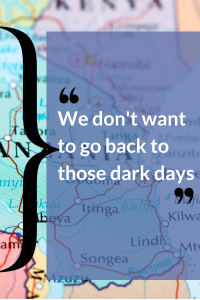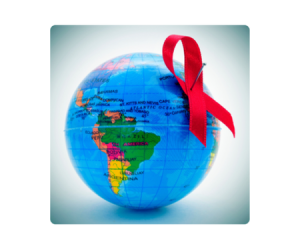When Dr. Paul Mmbando was in medical school 20 years ago, AIDS was generally a death sentence. Nowadays with better drugs, when the conditions of good nutrition and sticking to the daily meds are met, it’s a disease like others that can often be managed.
Dr. Paul leads the health department for the Evangelical Lutheran Church in Tanzania (ELCT). Daudi Msseemmaa, ELCA Regional Representative to East Africa talked to him on Nov. 17, 2025 about how the church’s role in making sure those conditions are met as World AIDS Day observance approached.
What has the church been doing in supporting people with HIV?
[Dr. Paul] The ELCT was the pioneer in launching palliative care services in Tanzania. Until recently, at least three-fourths of our palliative care patients had HIV. Annual AIDS deaths in Tanzania are now a fraction of what they were in those early days, and to keep it that way we need to be proactive about medicines, nutrition and education. In April 2022 we started a partnership with USAID [the U.S. Agency for International Development] that led to youth-focused HIV/Aids services that reached more than 250,000 people. This year, that project was one of the casualties of the American aid freeze. There were more than 167,000 participants at the time it was shut down.
What did the aid freeze mean for you?
[Dr. Paul] It was a big blow to the health sector nationally. But for the church, it decimated our staff and volunteers’ ability to follow up on patients to make sure they were getting their medicines, to take orphans to the clinic, to support livelihoods so people can afford food. It meant non-adherence, which in turn means higher viral loads, increased transmission of HIV, and reversing the progress of the last decade. We don’t want to go back to those dark days.
 What are you doing now?
What are you doing now?
[Dr. Paul] We still need to meet the UNAIDS [United Nations Program on HIV/AIDS] targets for Tanzania of 95-95-95, where 95% of people with HIV know their status, 95% of them are on antiretroviral medicines (ARVs), and 95% of those on ARVs have suppressed viral loads (which means fewer HIV copies in the blood, making it less transmissible). But we can’t do it on our own.
We reached out to partners to fill some of the gaps for the most essential services that were cut. With ELCA support we have just relaunched some essential services for vulnerable youth in three regions through SARAH Project. ELCT has also conducted for the first time a unique fundraising event through the first annual ELCT Marathon, income from which was dedicated to bridge gaps caused by this project termination.
Despite those efforts, we have a long way to go to meet the need, but since this work is part of our calling as a church and our vocation as individuals, we keep pushing. HIV doesn’t need to be a death sentence.
We remain grateful for the solidarity and companionship to make a difference while amplifying our voice for the voiceless and those in need.
Are you moved to act?
You’re invited to share your values and experiences with your federal representatives using the Action Alert posted 11/19/2025. You can make a difference for global neighbors.
Thank you for your advocacy.

